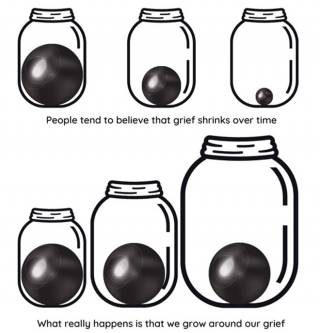The 'we' in grief
29 November 2021
Grief is a common experience, but something that can be difficult to talk about. For National Grief Awareness Week, UCL student Esther Ambrose-Dempster gives her words of advice to fellow students.

We rarely pay much attention to grief and how to cope with it, until we find ourselves caught in it. It can be really tough, so maybe that’s why we avoid the subject, and the feelings it evokes. Scarily, it reminds us of our mortality and that of those around us, including our loved ones. And it also brings up questions like ‘why are we here?’ Difficulty in knowing how to react and process grief, in knowing and understanding how we feel, can make it really isolating.
This National Grief Awareness Week (2 to 8 December), here are three thoughts I’m shining a light on, from my personal experience with grief. Exploring and validating what we each feel in response to grief, whether this aligns with what is expected or not, can help us manage.
Ultimately whilst nothing will make it disappear, knowing we are not alone can provide some comfort.
A common shared experience
There is often a taboo around grief, which can contribute to feelings of isolation when we’re going through it. But as a fact of life, grief is one of the most common shared experiences.
Grief, caused by loss, is often born out of love. Most of us can understand and empathise, from going through similar experiences. As Helen Keller wrote, "We bereaved are not alone. We belong to the largest company in all the world - the company of those who have known suffering".
It is similar to loneliness or feeling like we don’t belong. As Matt Haig so poignantly covers in The Comfort Book, these feelings are some of the most common causes for people seeking therapy. This again creates a huge community of people, all with loneliness paradoxically in common. Uniting us in our humanity and our vulnerability, ‘isolation is as universal as it gets’.
The individuality of coping
The difference between these shared experiences though, is the unique nature of what each of us feel when grieving. It’s utterly individual. While there are typical feelings associated with it, everyone will travel different paths in their coping mechanisms
Some need to ‘let it all out’, but others won’t. This is okay. We might feel happy and experience waves of grief, and that is also okay. There’s no list of emotions we ‘should’ feel whilst we grieve.
This said, recognising symptoms and emotions is a useful way to make them less scary. Symptoms are both physical and mental, and can be caused by neurological responses to grief. ‘Broken heart syndrome’ is a temporary increase in stress hormones and neurochemicals released. It causes physical symptoms like chest pain and shortness of breath. Some might experience depression, also commonly temporary. And these can be worrying if not understood.
Acknowledging the physical and mental effects won’t necessarily heal the symptoms, but by making them a known entity, they’re not as frightening, especially if we feel alone. It also gives us the best chance possible to cope with them. Understanding the science behind grief may help some.
Time as a healer
There’s a reason that we have all heard this phrase before. Cliché or not, the time element is personally what I have found most comforting. Knowing that moving forward through time, how I feel will be surrounded by more life, gives me hope for the future. (This concept was first explored by Dr. Lois Tonkin.)

Until chronological time and distance from the trigger start to help, we must give ourselves patience and time to cope as well. Some might carry on as normal, or fill all their time. Others will need to move towards and accept the feelings encompassing them. However we cope, time will move forward. As it does, waves of grief tend to become more manageable and spread out. Remembering this might provide a little hope. [Image credit: The Ralph site.]
Help is there
Letting people in at this time can be difficult. If you do, grief is something your lecturers, tutors and department will be able to make allowances for in terms of deadlines, attendance etc. This might help alleviate some of the pressure and stress your mind and body are going through.
There are also people out there ready to listen if you want to talk to someone. It is likely they will have been through something similar on some level. Resources and links for signing up are at the bottom of this page.
In these moments it is even more important to remember to be kind to ourselves. Self-compassion can be tricky, but it can make difficult times slightly easier, and help us move through them. Though we are likely to feel lonely at points, we are never alone. We belong to the largest community of people to ever exist.
Support available from UCL
Join our online events happening from 6 to 14 December to mark National Grief Awareness Week.
Register with Student Psychological and Counselling Services.
Explore our bereavement resources, including practical advice, counselling and external support.
Esther Ambrose-Dempster, PhD Chemistry
 Close
Close

